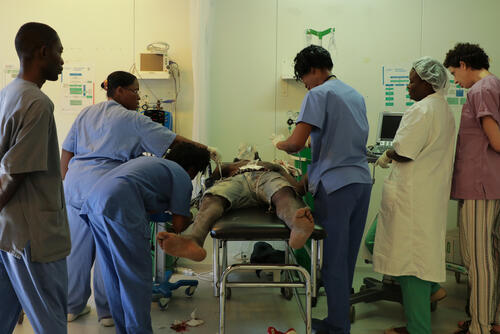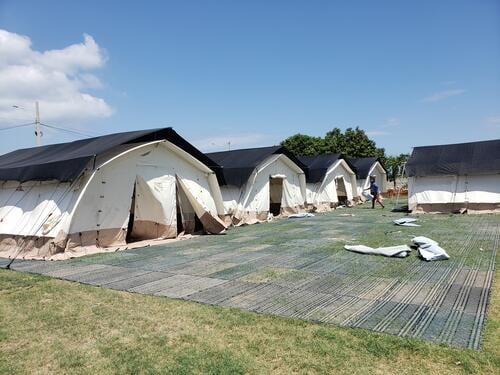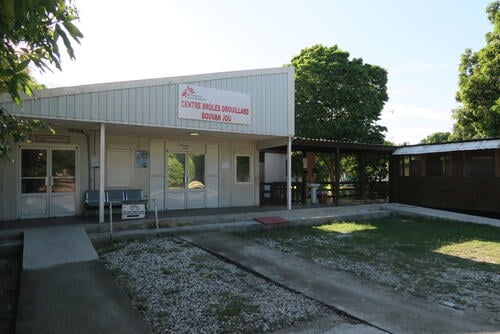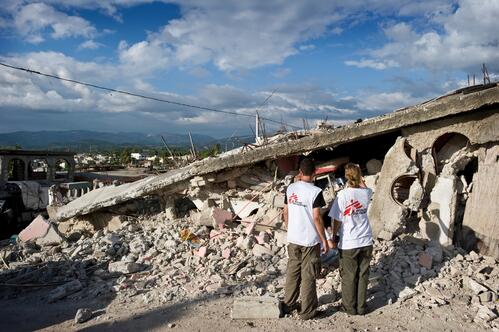In the three months since its opening, the Tabarre trauma hospital run by Médecins Sans Frontières (MSF) in Port-au-Prince, Haiti, has admitted over 360 patients in need of lifesaving care, including over 220 patients with gunshot wounds and other violence-related injuries.
“Since opening the hospital in Tabarre, we have seen on a daily basis the devasting impact that violence—from fighting between gangs to violence associated with political demonstrations—has on the lives of people in Port-au-Prince and beyond,” said Hassan Issa, MSF Head of Mission in Haiti. “The number of severe injuries from violence that we have treated reflects the dire situation prevailing today in Haiti’s urban areas, where gang shootings, car hijackings and kidnappings regularly occur.”
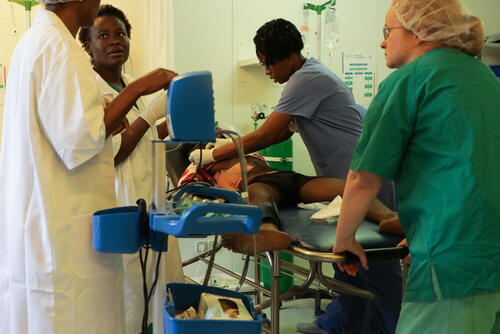
MSF expands hospital, but still near-full capacity
In order to help more patients, shortly after opening, MSF doubled the hospital’s capacity by expanding to 50 hospital beds. Ever since, the hospital has consistently remained at near-full capacity, with sporadic peaks in admissions following major incidents of violence or accidents.
The most recent peak in activity occurred last week around the period of carnival, when the hospital had its highest number of admissions in a single week with 37 new hospitalised patients. During the same period, we organised escorted rides for our staff to and from work in order to ensure 24-hour service, despite armed road barricades and a citywide curfew following a deadly shootout between the army and protestors from the police force.
MSF Tabarre hospital
Trauma hospital admissions by injury type
Gunshots and road accidents most common causes of injury
Over the last three months, the trauma hospital team has treated patients from many neighbourhoods of Port-au-Prince and surrounding areas, with most coming from Port-au-Prince (20%), Croix-des-Bouquets (13%), Delmas (13%), Cité Soleil (11%) and Carrefour (11%).
The most common causes of injury were gunshots (50% of admitted patients) followed by road traffic accidents (31%) and other violence-related injuries, including potentially fatal knife wounds (12%).
Our team at the Tabarre trauma hospital is working daily to help address the needs of the population. In addition to providing life-saving operations and emergency care, we began offering follow-up monitoring and physiotherapy to discharged patients in January.
Since the summer of 2018, Haiti has been experiencing a political and economic crisis, which has put a severe strain on the country’s healthcare system. As a result, MSF has reinforced our assistance to the Ministry of Public Health and Population by providing support to Port-au-Prince’s main public hospital, a hospital in Port Salut in the South department and 10 health centres throughout the country. In addition, around Port-au-Prince, we continue to run the Drouillard Burns Hospital in Cité Soleil, the MSF Emergency Center in Martissant, and Pran Men m clinic for survivors of sexual violence in Delmas. In February, we opened our newest project in Haiti, which focuses on adolescent sexual health, including sexual violence, in Gonaives in the Artibonite department. Read our 2020 report, “Haiti: Ten Years On,” to learn more about MSF’s work in Haiti over the last decade.



